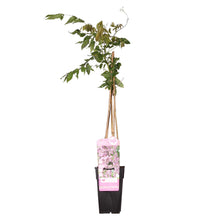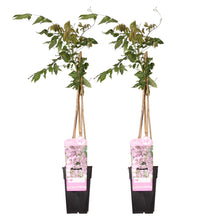Wisteria floribunda 'Rosea', also known as the pink Japanese wisteria, is a captivating deciduous climber admired for its graceful racemes of fragrant, rose-pink flowers. This cultivar of Wisteria floribunda produces an abundance of long, pendulous flower clusters that can reach up to 50cm (20in) in length, creating a breathtaking spectacle in late spring and early summer. The delicate pink blossoms, often with a hint of lavender, exude a sweet, alluring fragrance that perfumes the air. It's a popular choice for adorning walls, fences, pergolas, and arbors, adding a touch of romance and elegance to gardens and outdoor spaces. It belongs to the Fabaceae family (the pea family).
Origin: Wisteria floribunda is native to Japan. 'Rosea' is a cultivar selected for its beautiful pink flowers.
Light: Wisteria floribunda 'Rosea' thrives in full sun. It prefers at least 6-8 hours of direct sunlight per day to encourage optimal flowering.
Water: Water regularly, especially during dry periods and the first year after planting. Wisteria prefers consistently moist soil, but avoid overwatering, which can lead to root rot.
Soil: Wisteria floribunda 'Rosea' prefers fertile, well-drained soil. It can tolerate a range of soil types, but thrives in loamy soil with a slightly acidic to neutral pH.
Support: As a vigorous climber, Wisteria floribunda 'Rosea' needs strong support to grow. Provide a sturdy trellis, pergola, or wires for the vine to climb on.
Pruning: Pruning is essential for maintaining the shape and promoting flowering of your wisteria. Prune twice a year: in summer, shorten the current year's growth to about 5-6 buds from the main branch; in winter, shorten the same shoots again to 2-3 buds. This encourages the formation of flower buds.
Hardiness: Wisteria floribunda 'Rosea' is hardy and can tolerate cold winters.
Uses: This wisteria is primarily grown as an ornamental climber for its stunning floral display and fragrance. It's a popular choice for creating beautiful arches, covering pergolas, and adding a touch of elegance to gardens.
Toxicity: Wisteria floribunda 'Rosea' contains wisterin, a toxic glycoside, in its seeds, pods, and bark. It's best to keep it away from children and pets.



